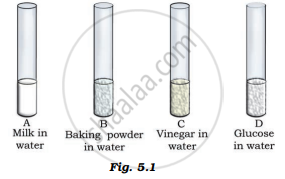Advertisements
Advertisements
Question
What is the difference between an alkali and a base?
Solution
| Alkali | Base | |
| 1. | An alkali is a basic hydroxide that, when dissolved in water, produces hydroxyl (OH−) ions, the only negatively charged ions. | A base is a chemical compound that, when reacting with a hydronium ion or H+ ions furnished by an acid, forms salt and water only. |
| 2. | All alkalis are water soluble. | Bases may or may not be water soluble. |
| 3. | All alkalis are bases | All bases are not alkalis. |
| 4. | Examples are NaOH, KOH, Ca(OH)2. | Examples are CuO, Mg(OH)2. |
APPEARS IN
RELATED QUESTIONS
Give one example in the following case:
A base which is not an alkali.
Bases are ______ in taste.
All bases are alkalis.
Give the significance of pH of soil in agriculture.
A solution changes the colour of the turmeric indicator from yellow to red. The solution is
Look at Figure 5.1 which shows solutions taken in test tubes A, B, C and D. What colour is expected when a piece of red litmus paper is dropped in each test tube? The nature of the solutions is given in the table for your help.

| Test tube | Nature of Solution | Change in colour of red litmus |
| A | Neutral | |
| B | Basic | |
| C | Acidic | |
| D | Neutral |
Phenolphthalein gives _________ colour with lime water.
Boojho, Paheli and their friend Golu were provided with a test tube each containing China rose solution which was pink in colour. Boojho added two drops of solution ‘A’ in his test tube and got dark pink colour. Paheli added 2 drops of solution ‘B’ to her test tube and got green colour. Golu added 2 drops of solution ‘C’ but could not get any change in colour. Suggest the possible cause for the variation in their results.
All bases are alkalis but all alkalis are not bases.
What are bases?
